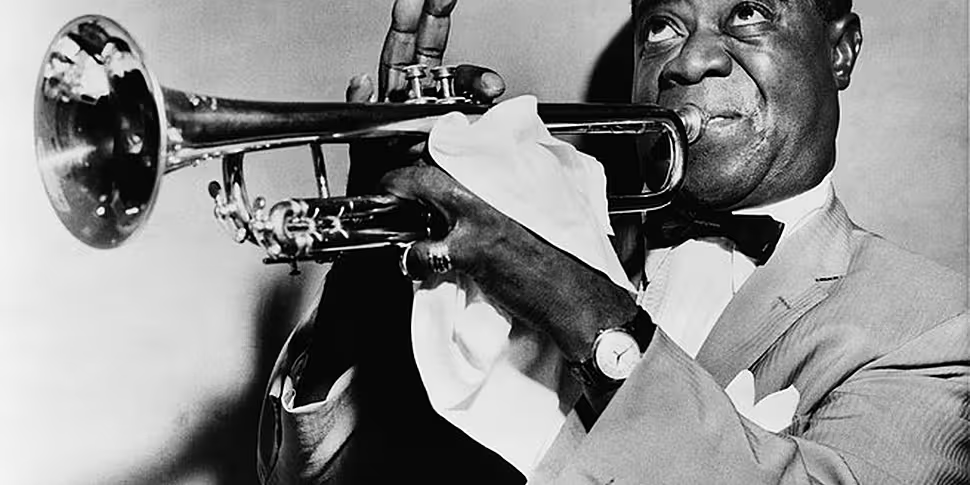In the 1920s jazz was sweeping the United States. The First World War and its aftermath had seen the American economy explode, creating a new generation of wealth begging to be spent. At the same time prohibition was pushing nightlife and the world of performance and entertainment underground and into the grip of the mob. The Roaring Twenties had created the perfect breeding ground for jazz to flourish as boundaries were pushed and norms challenged.
Though the ‘30s put an end to the speakeasies and the economic boom jazz persevered. One of the most important figures in the development and popularising of the jazz movement during this time and the rest of the 20th century was Louis Armstrong. In fact the life of this great performer almost mirrors the story of jazz.
Born in 1901 in New Orleans Louis’ early years were marked by poverty and hardship. At an early age Louis’ father left the family for another woman, leaving Louis and his sister to be raised by his mother, grandmother, and other relatives. With money tight Louis was forced to work from a young age, delivering papers and hauling coal. This latter job brought him to the brothels and dancehalls of his neighbourhood where he encountered New Orleans’s rich nightlife and musical scene.
Being so immersed in this world it wasn’t surprising that Louis pursued a life in music. By the age of eleven some of the local musicians had begun to teach him how to play the cornet by ear and he was singing on the streets for money. He had also left school by this time and was getting into trouble with the law. These wayward actions proved to be the next step on Louis musical journey, however, as he was sent to the New Orleans Home for Colored Waifs.
The Home had a band and musical education provided by a Professor Peter Davis. Recognising a talent in Louis, Davis began to give the young boy a proper musical education. The lessons proved fruitful and Louis was soon made leader of the band. Louis quickly made a name for himself as the Home band played in venues around New Orleans. At fourteen years old he was released from the Home and got his first gig playing at Henry Ponce’s dancehall. Though he still hauled coal by day Louis musical career had gotten under way.
Over the following years Louis continued to play in venues around New Orleans and the Mississippi, growing his musical skill and repertoire and learning how to read music. In 1922 Louis joined the mass migration of African-Americans to Chicago, which was the jazz capital of the world. Louis had travelled at the invitation of Joe ‘King’ Oliver, an old mentor from New Orleans and leader of the most influential and popular jazz band at the time. For the first time in his life Louis was making enough money to support himself on music alone.
Over the following years the legend of Louis Armstrong began to grow. In Chicago other musicians came to challenge this rising phenomenon and his unbelievable hornblowing. He made his first recordings and played with the biggest bands in New York and Chicago; always bringing a noticeable change to their sound that remained even after he left. By 1925 the Louis Armstrong legend was well on its way to being realised and his wife was billing him as ‘the World’s Greatest Trumpet Player’ for his return to Chicago.
Though this success had transformed into real world wealth, Louis didn’t sit on his laurels; mainly at the insistence of his then wife Lil. For the rest of the Roaring Twenties he continued to develop his own sound and change the face of jazz. Now leader of his own band Louis had the freedom to encourage and promote his own style of easygoing jazz. The most important development of this time, however, was Louis increased interest in vocals and scat singing.
In 1926 Louis Armstrong and his Hot Five recorded ‘Heebie Jeebies’. Now famous as one of the first recorded uses of scat, the record swept across the US making the group the most famous jazz band in America. For the rest of the decade Louis continued to capture the public’s attention with his warm voice and melodic style. This fame stood Louis well as the Roaring Twenties transitioned into the Great Depression.
On October 29th 1929 the US stock market suddenly collapsed. This crash resounded around the world as the global economy faltered and fell. America was one of the worst places hit as industrial production stagnated and foreign trade dried up. As the jazz scene had risen with the prosperity of the ‘20s so it crashed with the Great Depression. Clubs closed and musicians were forced to look for other work. The big bands that had epitomised the genre up till now started to disappear, becoming replaced by smaller ensembles.
Louis survived the Depression by moving to where the money was, Los Angeles. Relatively insulated from the economic downturn the City of Angels had a thriving nightlife. Louis quickly became a favourite of the Hollywood crowd and was soon appearing on the silver screen. This branching into cinema and television would see the face of Louis Armstrong, with its broad warm smile, become almost as famous as his voice and musical sound.
Music was, however, his true calling and first love and for the rest of his life Louis would tour, record, and develop his sound. In 1964 his recording of ‘Hello, Dolly!’ knocked the Beatles off the top of the pop chart and Louis Armstrong became the oldest person to hold the No. 1 spot to date. Though limited by old age and failing health, Louis still wowed audiences, and often his own band, with astounding performances to his dying day.
On July 6th 1971, a month shy of his 70th birthday, Louis Armstrong died in his sleep. He had become not only an icon of the musical scene but one of its chief architects. He brought a warm and soulful style to jazz that inspired many, both in and outside of the scene. Though he had been born poor in New Orleans’ red-light district, Louis Armstrong died one of the most beloved men in America. In a world fiercely divided by colour Louis’ fame had carved him a place at almost every table.
Patrick will be joined by a panel of experts as ‘Talking History’ looks back at the life of the legend, Louis Armstrong. What was Satchmo’s life really like? Why was his music so appealing? Could he, or should he, have done more during the Civil Rights Movement? And how did he earn the nickname ‘Ambassador Satch’? Join us this Sunday for the answers to these questions and more.









